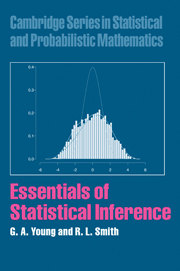Book contents
9 - Higher-order theory
Published online by Cambridge University Press: 06 July 2010
Summary
In Chapter 8, we sketched the asymptotic theory of likelihood inference. It is our primary purpose in this chapter to describe refinements to that asymptotic theory, our discussion having two main origins. One motivation is to improve on the first-order limit results of Chapter 8, so as to obtain approximations whose asymptotic accuracy is higher by one or two orders. The other is the Fisherian proposition that inferences on the parameter of interest should be obtained by conditioning on an ancillary statistic, rather than from the original model. We introduce also in this chapter some rather more advanced ideas of statistical theory, which provide important underpinning of statistical methods applied in many contexts.
Some mathematical preliminaries are described in Section 9.1, most notably the notion of an asymptotic expansion. The concept of parameter orthogonality, and its consequences for inference, are discussed in Section 9.2. Section 9.3 describes ways of dealing with a nuisance parameter, through the notions of marginal likelihood and conditional likelihood. Parametrisation invariance (Section 9.4) provides an important means of discrimination between different inferential procedures. Two particularly important forms of asymptotic expansion, Edgeworth expansion and saddlepoint expansion, are described in Section 9.5 and Section 9.6 respectively. The Laplace approximation method for approximation of integrals is described briefly in Section 9.7. The remainder of the chapter is concerned more with inferential procedures. Section 9.8 presents a highlight of modern likelihood-based inference: the so-called p* approximation to the conditional density of a maximum likelihood estimator, given an ancillary statistic.
- Type
- Chapter
- Information
- Essentials of Statistical Inference , pp. 140 - 168Publisher: Cambridge University PressPrint publication year: 2005

